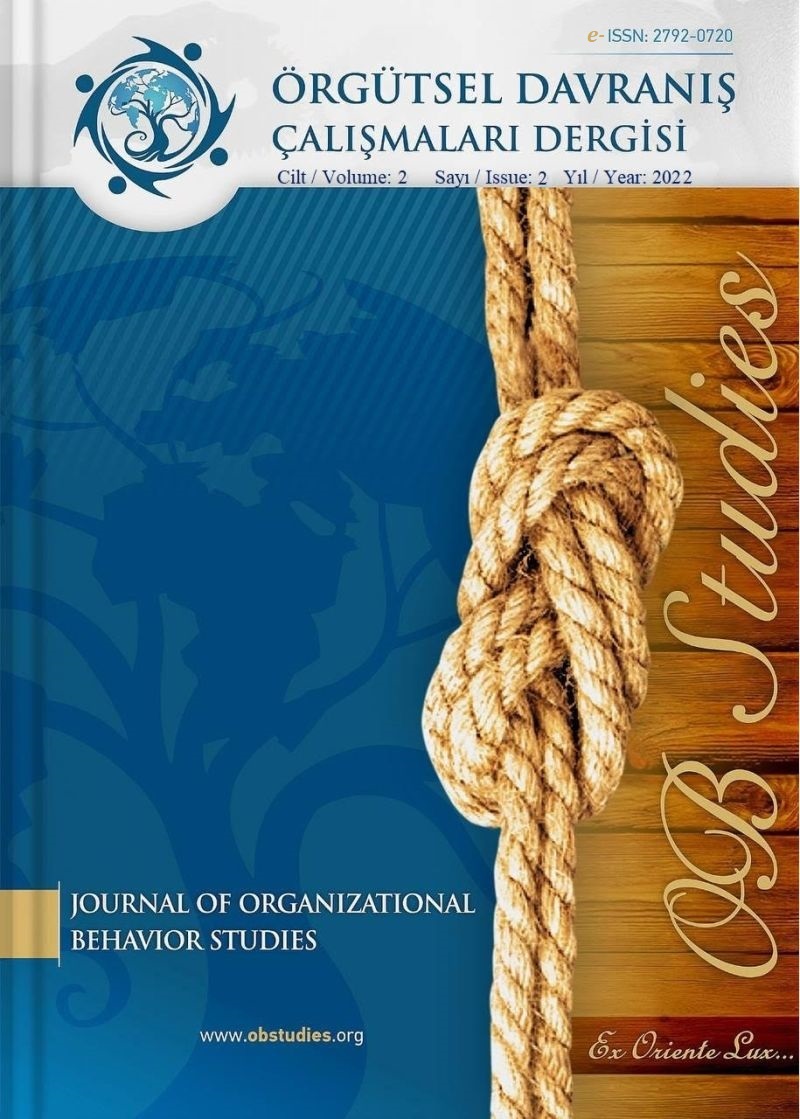A RESEARCH ON EMPLOYEES’ PERCEPTIONS OF CHANGE IN THE COVID 19 PROCESS: AN APPLICATION IN THE BANKING SECTOR
Keywords:
changeorganizational change, worker resistance, changeAbstract
The continuous dynamic structure of change is an action that cannot be stopped or even slowed down. Organizations must keep up with change by constantly questioning their internal and external structures. When organizations take part in the change, they will have the power to continue their existence. In this study, it is tried to explain how to adapt to change by examining the attitudes of employees towards change and the necessity of change for organizations. The resistance to change and perceptions of change of employees in the banking sector, which is one of the sectors that need to keep up with the change due to the Covid 19 epidemic that caused the pandemic, are examined. The research was carried out with 15 people operating in different cities and different banks by adopting the qualitative research technique and using a semi-structured interview form consisting of 9 questions as a data collection tool. In the research, it was concluded that change is necessary for the institution. It turns out that 20% of them are resistant to change, their skills to cope with change are weak and their threshold levels for change are low. Although it is believed that change is necessary, it is seen that change is always an action that is resisted and faced with prejudice.
The study was conducted for the perceptions of change of banking sector employees during the Covid 19 pandemic and is expected to shed light on the research to be carried out in different sectors.
Keywords: Change, Organizational Change, worker resistance
References
Aktaran, C. C. (2017, 7 15). Değişen Dünya ve Yeni Dinamikler. Sılo.Tıps: https://silo.tips/download/deen-dnya-ve-yen-dnamkler-1 adresinden alındı
Arifin, K. (2020). FactorsInfluencingEmployeeAttitudesToward Organizational Change: Literature Review. 5th ASEAN Conference on Psychology, Counselling, andHumanities (ACPCH 2019), 188-191.https://doi.org/10.2991/assehr.k.200120.039
Aslaner, E. (2010). Örgütsel Değişim ve Yenilikçilik: Bir Özel Okul Örneği. [Yayınlanmamış Yüksek Lisans Tezi], Ankara: Ankara Üniversitesi.
Bannet, W. P., & Carroll, G. R. (1995). ModelingInternal Organizational Change. Annual Review of Sociology, 21, 217-236. https://doi.org/10.1146/annurev.so.21.080195.001245
Çiçeklioğlu, H. (2020). Örgütsel Değişim ve Değişim Yönetimi. İ. Bakan içinde, Örgütsel Davranış (s. 535-560). İstanbul: Beta.
Demirel , S. (2021). Covid-19 Pandemi Sürecinin Dijital Bankacılık İşlemleri Üzerinde Etkisi. Bankacılık ve Sermaye Piyasası Araştırmaları Dergisi, 5(11), 49-64
Dertli, D. (2008). Örgütsel Bir Değişim Olarak Teknolojik Değişime İşgörenlerin Yaklaşımı Ve İşgörenlerde Etkisi: Öztay Tekstil (Abbate) Örneği. [Yayınlanmış Yüksek Lisans Tezi], Kütahya: Dumlupınar Üniversitesi.
Düzel Dilden, B. (2010). Değişim Yönetimi Bağlamında Ast Üst İlişkisi: Adana Teiaş Örneği. [Yayınlanmış Yüksek Lisans Tezi], Ankara: Gazi Üniversitesi.
Dursun, E. (2007). Örgütsel değişim ve Değişim Karşısında Bireysel Direnç. [Yayınlanmış Yüksek Lisans Tezi], Kütahya: Dumlupınar Üniversitesi
Furxhi, G. (2021). Employee'sResistanceand Organizational ChangeFactors. European Journal of Business Management Research, 30-32.https://doi.org/10.24018/ejbmr.2021.6.2.759
Gartrner (2020) GartnerCautions HR LeadersThat the Risk of ChangeFatigueAmongEmployees has Doubled in 2020). https://www.gartner.com sitesinden alındı.
Halkos, G. E., &Bousinakis, D. (2016). The Effect of Crisis on Employees’ StressandDissatisfaction, MPRA (MunichPersonalRePEc Archive), 1-24.
Hassan, A. T. (2018). Organizational Change Management: A Literature Review. Available at SSRN 3135770, 1-43.DOI:10.2139/ssrn.3135770
Koç, Z. (2014). Örgütsel Değişim, Değişim Yönetimi ve Örgütsel Davranışlar Üzerine Örnek Bir Uygulama. [Yayınlanmış Yüksek Lisans Tezi], İstanbul: Bahçeşehir Üniversitesi.
Moran, J. W., &Brightman, B. K. (2000). Leading Organizational Change. Journal of Workplace Learning, 12(2), 66-74. https://doi.org/10.1108/13665620010316226
Odor, H. O. (2018). OrganisationalChangeand Development. European Journal of Business and Management, 10(7), 58-66.
Ordun, G. (1998). Örgütsel Değişim ve Değişime Direnç: Bankacılık Sektöründe Gerçekleştirilen Bir Araştırma. [Yayınlanmış Yüksek Lisans Tezi),İstanbul: İstanbul Üniversitesi.
Özkan, Y. (2004). İşletmelerde Değişime Direnme ve Çözüm Yöntemlerinin İncelenmesi. İş, Güç, Endüstri İlişkileri ve İnsan Kaynakları Dergisi, 6(1),14-20.
Patton, M. Q, (2015), QualitativeResearch& Evaluation Methods : İntegrating Theory and Practice (Fourthedition ) London: Sage
Rızescu, A., &Tıleaga, C. (2016). Factors Influencıng Contınuous Organısatıonal Change. Journal Of DefenseResources Management, 7, 139-144.
Sezgin, O. B., Tolay, E., & Sürgevil , O. (2016). Örgütsel Değişim Sinizmi: Çalışanların Değişime Karşı Tutumlarının İncelenmesine Yönelik Nitel Bir Araştırma. Marmara Üniversitesi Öneri Dergisi, 12(45), 411-438.
Şahin, T. (2017). Örgütsel Değişimin Çalışanların Güven ve Bağlılık Düzeyleri Üzerindeki Etkisi ve Bir Uygulama. [Yayınlanmış Doktora Tezi], İstanbul: İstanbul Ticaret Üniversitesi.
Şenturan, Ş. (2014). Örnek Olaylarla Örgütsel Davranış.(1. Basım), İstanbul: Beta.
TDK. (2019). 11 23, 2021 tarihinde Türk Dil Kurumu Sözlükleri: https://sozluk.gov.tr/ adresinden alındı.
Ulusoy, A., & Demirel , S. (2021). Bankacılık Sektöründe Dijital Dönüşümün İstihdam Üzerine Etkisi. HAK-İŞ Uluslararası Emek ve Toplum Dergisi, 10(27), 256-267.
Yapıkredi Blog. (2022, 08 2). Yapıkredi Blog: https://www.yapikredi.com.tr/blog/yasam/yasam-kulturu/detay/pandemi-sureci-bankaciligi-hangi-yonlerde-gelistirdi adresinden alındı
Yazgan, A. E., Karadağ Ak, Ö., & Telli Üçler, Y. (2022). Dijitalleşmenin Türk Bankacılık Sektörüne Yansımaları. Five Zero, 2(1), 48-59.
Yetiz, F. (2021). COVID-19 Pandemi Sürecinin Türk Bankacılık Sektörü Çalışanlarına ve Müşterilerine Etkileri: Swot Analizi. Avrupa Bilim ve Teknoloji Dergisi, (22), 109-117.

Downloads
Published
How to Cite
Issue
Section
License
Copyright (c) 2022 Journal of Organizational Behavior Studies

This work is licensed under a Creative Commons Attribution-NonCommercial-NoDerivatives 4.0 International License.
Accepted 2022-12-20
Published 2022-12-31




